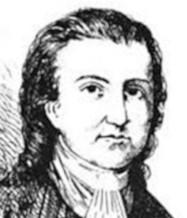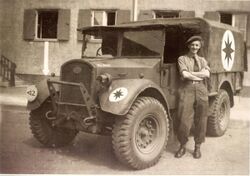Fretrekeriners
| Religious Society of Companions | |
|---|---|
| Religieus Genootschap van Metgezellen | |
 Garrelt Miedema, principle founder of the Religious Society of Companions (Fretrekerinism) | |
| Classification | Variable; depends on meeting |
| Scripture | Ancient and New Treasury |
| Theology | Practical theology |
| Polity | Congregational |
| Region | Central Norumbia, specifically Mniohuta |
| Language | Mniyapi Bergian Kamryker |
| Headquarters | Walgroinzin (de facto) |
| Founder | Garrelt Miedema Arend Jansen Anika Visser |
| Origin | December 3rd, 1748 (Seperation from Honorian Church) Ottonia |
| Separated from | Corsanguine Churches |
| Members | approx. 3.6 million |
Fretrekeriners are people who belong to a historically Protestant Christian set of denominations known formally as the Religious Society of Companions. Members of these movements are generally united by a belief in each human's ability to experience the light within or see "that of God in every one". Some profess a priesthood of all believers inspired by the First Epistle of Peter. They include those with several different branches with varying understandings of Christianity and in Mniohuta, with Wakanist traditions. There are also Nontheist Fretrekeriners, whose spiritual practice does not rely on the existence of a God or Gods. To differing extents, the Companions avoid creeds and hierarchical structures.
The proto-evangelical Christian movement known as Fretrekerianism arose in mid-18th-century Ottonia from the Corsanguine Churches breaking with the Honorian Church. The Fretrekeriners, especially the First Publishers of Truth, sought to convert others by travelling through Ottonia and overseas preaching the Gospel. They based their message on a belief that "Christ has come to teach his people himself," stressing direct relations with God through Jesus Christ and direct belief in the universal priesthood of all believers. This personal religious experience of Christ was acquired by direct experience and by reading and studying of the Bible. Fretrekeriners focused their private lives on behaviour and speech reflecting emotional purity and the light of God, with a goal of Christian perfection.
Under the leadership of Garrelt Miedema, the majority of main-faith Fretrekeriners were led overseas to a “Great and rich land to the West.” In 1748 they arrived in Eastern Wazheganon where they were met by mixed but generally negative reactions to their arrival. Following failed attempts at establishing a presence in Mågdeland, Garrelt Miedema led his followers through lake country to modern MadæchÏra where they learned of a land along the coast to the Southwest from which they’ve heard their ancestors live. Eventually they made their way to modern Walgroinzin where they established a settlement in land uninhabited by the indigenous Waziyata bands, gradually interacting and integrating with them.
Past Fretrekeriners were known to use thee as an ordinary pronoun, refuse to participate in war, wear plain dress, refuse to swear oaths, and practice teetotalism. Fretrekeriners are renown for their international philanthropic efforts, including abolition of slavery, nuclear disarmament, prison reform, and social justice.
Historical overview
Founding
The Vision
Migration to Wazheganon
Arrival in Mniohuta
Garrelt Miedma and the Waziyata
Universalist Split
Asherionic Wars
Fretrekeriner Renaissance
Fretrekerianism Today
Theology
Fretrekeriners' theological beliefs vary considerably. Tolerance of dissent widely varies among yearly meetings and congregations. Most Companions believe in continuing revelation: that God continuously reveals truth directly to individuals. Anika Visser, one of the First Publishers of Truth, said, "Christ has come to teach His people Himself." Companions often focus on trying to feel the presence of God. As Blowing Earth (Tȟatémakȟá, ᖬᑌᐁᒪᐠᐦᐦᐊ), a Fretrekeriner convert, wrote in 1777, "It is not enough to hear of Christ, or read of Christ, but this is the thing – to feel his light to be my root, my life, and my foundation..." Fretrekeriners reject the idea of priests, believing in the priesthood of all believers. Some express their concept of God using phrases such as "the inner light", "inward light of Christ", or "Holy Spirit".
Diverse theological beliefs, understandings of the "leading of the Holy Spirit" and statements of "faith and practice" have always existed among Companions. Due in part to the emphasis on immediate guidance of the Holy Spirit, Fretrekeriner doctrines have only at times been codified as statements of faith, confessions or theological texts. Those that exist include the Publication of Truth (1748), Universal Declaration of Faith (adopted by the Walgroinzin Meeting, 1754) and Essential Truths (1883). Most yearly meetings make a public statement of faith in their own Book of Discipline, expressing Christian discipleship within the experience of Companions in that yearly meeting.
Universalists
Universalist Companions affirm religious pluralism: there are many different paths to God and understandings of the divine reached through non-Christian religious experiences, which are as valid as Christian understandings. The group was founded shortly after the arrival of Fretrekeriners in Walgroinzin when Garrelt Miedema entered a sweat lodge with Waizata tribesmen for several days, discussing theological similarities and having several visions.
Upon emerging from the sweat lodge, they proclaimed that they were a Wíŋkte (ᐏᐣᐟᑫ), a third gender in Thituwan cultures and would seek a vision quest in order to earn their true name. When they returned from their vision quest, they announced a number of theological changes, particularly religious pluralism and universal reconciliation, which drew the ire of Anika Visser and many of her confidants who decided to split from the main settlement and sailed further West. Universalists are known for integrating aspects of other faiths, particularly those of the many indigenous tribes of Norumbia who they interacted with and to an extent with Ottoninan pagan movements as well.
Traditionalists
Traditionalist Companions, share some of the beliefs of Garrelt Miedema and the other First Publishers of Truth. Many Traditionalists see themselves as the Fretrekeriners whose beliefs are truest to original Fretrekeriner doctrine, arguing that the majority of Companions "broke away" from the Traditionalists in the 19th century (rather than vice versa). Traditionalist Companions place their trust in the immediate guidance of God. They reject all forms of religious symbolism and outward sacraments, such as the Eucharist and water baptism. Traditionalist Companions do not believe in relying upon the practice of outward rites and sacraments in their living relationship with God through Christ, believing that holiness can exist in all of the activities of one's daily life – and that all of life is sacred in God. Many believe that a meal held with others can become a form of communion with God and with one another.
Visserists
Visserist Companions regard Jesus Christ as their personal Lord and Saviour, and have similar religious beliefs to other evangelical Christians. They believe in and hold a high regard for penal substitution of the atonement of Christ on the Cross at Calvary, biblical infallibility, and the need for all to experience a relationship with God personally. They believe that the Evangelical Companions Church is intended to evangelise the unsaved of the world, to transform them spiritually through God's love and through social service to others. They regard the Bible as the infallible, self-authenticating Word of God. The statement of faith of Evangelical Companions International is comparable to that of other Evangelical churches. Those who are members of Evangelical Companions International are mainly located on the isle of Iyokihaf and in Ottonia.
Beginning in the 1830s, some Companions began using outward sacraments in their Sunday services, first in Evangelical Companions Church–Home Region (then known as Ottonia Yearly Meeting). Companions Church–Home Isles Region also approved such a practice. In places where Evangelical Companions engage in missionary work, adult baptism by immersion in water occurs. In this they differ from most other branches of the Religious Society of Companions.
Calendar and church holidays
Fretrekeriners traditionally use numbers for naming the months and days of the week, something they call the plain calendar. This does not use names of calendar units derived from the names of pagan deities. The week begins with First Day (Sunday) and ends with Seventh Day (Saturday). Months run from First (January) to Twelfth (December). This rests on the terms used in the Bible, e.g. that Jesus Christ's followers went to the tomb early on the First Day. The plain calendar emerged in the 16th century in Ottonia in rural communities and breakaway protestant movements, but became closely identified with Companions by the end of the 1800s, and was commonly employed into the 20th century. It is less commonly found today. The term First Day School is commonly used for what is called by other churches Sunday School.
Unlike other Christian groups, Fretrekeriners generally eschew typical religious festivals (e.g. Christmas, Lent, or Easter), but believe that Christ's birth, crucifixion and resurrection, should be marked every day of the year. For example, many Fretrekeriners feel that fasting in Lent, but then eating in excess at other times of the year is hypocrisy. Many Fretrekeriners, rather than observing Lent, live a simple lifestyle all the year round. Such practices are called the testimony against times and seasons. Certain holidays such as Midsummer are celebrated annually by congregations in Eastern Mniohuta, but these are often holdovers from Ottonia that have only come to blend with religion because of patterns of settlement.
Some Companions are non-Sabbatarians, holding that "every day is the Lord's day," and that what should be done on a First Day should be done every day of the week, although Meeting for Worship is usually held on a First Day, after the advice first issued by elders in 1756.
Governance and organisation
Organisational government and polity
Governance and decision-making are conducted at a special meeting for worship – often called a meeting for worship with a concern for business or meeting for worship for church affairs, where all members can attend, as in a Congregational church. Fretrekeriners consider this a form of worship, conducted in the manner of meeting for worship. They believe it is a gathering of believers who wait upon the Lord to discover God's will, believing they are not making their own decisions. They seek to understand God's will for the religious community, via the actions of the Holy Spirit within the meeting.
As in a meeting for worship, each member is expected to listen to God, and if led by Him, stand up and contribute. In some business meetings, Companions wait for the clerk to acknowledge them before speaking. Direct replies to someone's contribution are not permitted, with an aim of seeking truth rather than debate. A decision is reached when the meeting as a whole feels that the "way forward" has been discerned (also called "coming to unity"). There is no voting. On some occasions Companions may delay a decision because they feel the meeting is not following God's will. Others (especially non-Companions) may describe this as consensus decision-making; however, Companions in general continue to seek God's will. It is assumed that if everyone is attuned to God's spirit, the way forward becomes clear.
Yearly Meetings
Fretrekeriners today are organised into independent and regional, national bodies called Yearly Meetings, which have often split from one another over doctrinal differences or distances between congregations. The practice of Yearly Meetings began as an adoption of the Thituwan tradition of Sun Dance, with first attendance by youth often being seen as a rite of passage with a requirement of sacrifice and fasting. Much like the Sun Dance, Yearly Meetings are often held in Summer months; most typically around the period of the Summer Equinox. It is often taken as an opportunity for congregations to discuss and agree on theological practices, as well as to share food and gifts and experiences in their faith. Many Fretrekerinist Yearly Meetings also belong to the Companions World Committee for Consultation, an international fellowship of Yearly Meetings from different Fretrekeriner traditions.
Membership
A Companion is a member of a Yearly Meeting, usually beginning with membership in a local monthly meeting. Means of acquiring membership vary. For example, in some X branch attenders who wish to become members must take part in some two years' adult education, memorising key Bible passages, and learning about the history of Fretrekerinism since its inception. Within the Y Yearly Meeting, membership is acquired through a process of peer review, where a potential member is visited by several members, who report to the other members before a decision is reached.
Within some Companions Churches in the X Branch – in particular in parts of Mniohuta – an adult believer's baptism by immersion in water is optional. Within Z Branch, Companions do not practise water baptism, Christening, or other initiation ceremonies to admit a new member or a newborn baby. Children are often welcomed into the meeting at their first attendance. Formerly, children born to Fretrekeriner parents automatically became members (sometimes called birthright membership), but this no longer applies in many areas. Some parents apply for membership on behalf of their children, while others allow children to decide whether to be a member when they are ready and older in age. Some meetings adopt a policy that children, some time after becoming young adults, must apply independently for membership.
International organization
The Companions World Committee for Consultation (CWCC) is the international Fretrekerinist organization that loosely unifies the different religious traditions of Fretrekeriners; CWCC brings together the largest variety of Companions in the world. Companions World Committee for Consultation is divided into four sections to represent different regions of the world: Norumbia and Oxidentale, Belisaria and Ghant, Scipia and Malaio, and Ochran. It is believed that these divisions are also meant to represent the four winds, a prominent feature in Wakanist religious traditions that may have influenced early Fretrekeriners.
There are many Fretrekeriner service organizations dedicated to peace and humanitarian activities overseas. The first, the Companion Service Council, (CSC), was founded in Mniohuta in the wake of the Asherionic Wars in order to provide medical and service aid to all sides of the conflict. Similar organizations have worked closely with indigenous aid agencies during the Osowanon Wars and during the Wiyopeyata Peninsula War.


